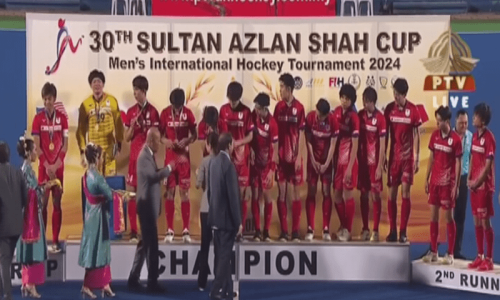THE Economist Intelligence Unit’s rating of Karachi as one of the world’s least livable cities is not surprising. Five categories were reviewed to arrive at this conclusion: stability, healthcare, education, culture and environment, and infrastructure. Karachi’s ranking was an abysmal 169th out of a total of 173 cities.
Karachi may be Pakistan’s largest city, but it has an uneasy existence in this context. It comprises a third of the total population of Sindh. The bulk of monetary resources and revenues originate in Karachi. In order to benefit economically, successive rulers have worked out controversial administrative arrangements to deprive Karachi of self-governing options.
After the 18th Amendment in 2010, Sindh’s chief minister and cabinet have acted like the mayor, deciding on almost every development and management prerogative — from garbage collection to running public transport. City inhabitants have hardly any say in decision-making that is pertinent to their daily lives.
Karachi’s political affairs are complex. It may appear that it is political groups and parties and the military and civilian establishment that call the shots. In reality, there are many more godfathers. Formal and informal developers ensure that whatever they need to keep their businesses going is made available without interruption. So we see unabated land supply for investment, albeit at the cost of farmlands, orchards and dwellings as indigenous settlements are uprooted and people evicted from planned localities and katchi abadis.
Pakistan’s largest city is ruled by many godfathers.
While a few thousand investors accrue exponential profits, millions of people see their lives altered for the worse. Realtors are ably assisted by the city administration, professional engineers, architects, contractors and service providers. Utility agencies bend the rules to extend their services to their schemes.
People in central city neighbourhoods are affected by erratic water supply while some of the remote real estate developments along the M-9 Motorway have no problem in receiving piped water supply.
In public transport, the old-fashioned transporters who ran buses and minibuses are now being replaced by trading enterprises that procure expensive buses and hardware for visibility on the city streets.
Officialdom claims that the bus rapid transit system will revolutionise city mobility, but the reality is otherwise. Even if all seven BRT lines were operational, they would cater to only nine per cent of total passenger trips at a hefty cost of over Rs170 billion.
In fact, BRT benefits large consulting firms, civil and other contractors, suppliers, service providers, etc. Ordinary citizens, especially along University Road and allied locations, are braving the inconvenience caused due to work on the BRT, which will significantly reduce active road space for all manner of vehicles.
Given that thousands of motorcycles and cars are registered every day and carry millions of commuters, how can one justify the exclusive right of way for BRTs ferrying a few thousand? Karachi’s roads are in a state of disrepair, with vehicles and passengers facing huge problems. Commuters frequently display road rage, frustration and helplessness.
Karachi has an ‘elected’ mayor, town council chairmen, union committee chairmen, councillors and other elected representatives who must operate under a legal regime that empowers them. If they are lucky, some funds will be granted to them to operate. These funds are expected to foot essential expenditure.
For management, repair and rehabilitation work, the local government entities will have to approach the provincial government. A familiar tug of war will begin between various tiers of government.
It is, however, possible that elected local entities take a different approach and change the situation to their as well as the city’s advantage. Using the status of their elected office, councillors and UC chairs may consider reaching out to their respective constituents, listening to their problems, and engaging with them.
These elected representatives can also liaise with civil society activists, public-spirited professionals, business and commerce leadership and academia to evolve a platform where core city matters can be debated.
To improve Karachi’s livability, the administration, political elite and business leadership would have to evolve a consensus on core matters.
Defining the metropolitan boundaries of the city, regulating the built environment, documenting and safeguarding heritage, repairing roads, engaging with communities for maintaining law and order, with the assistance of the agencies concerned, and improving water and air quality by controlling pollution can become the starting agenda for this broad-based conversation.
The writer is an academic and researcher based in Karachi.
Published in Dawn, July 17th, 2023














































Dear visitor, the comments section is undergoing an overhaul and will return soon.